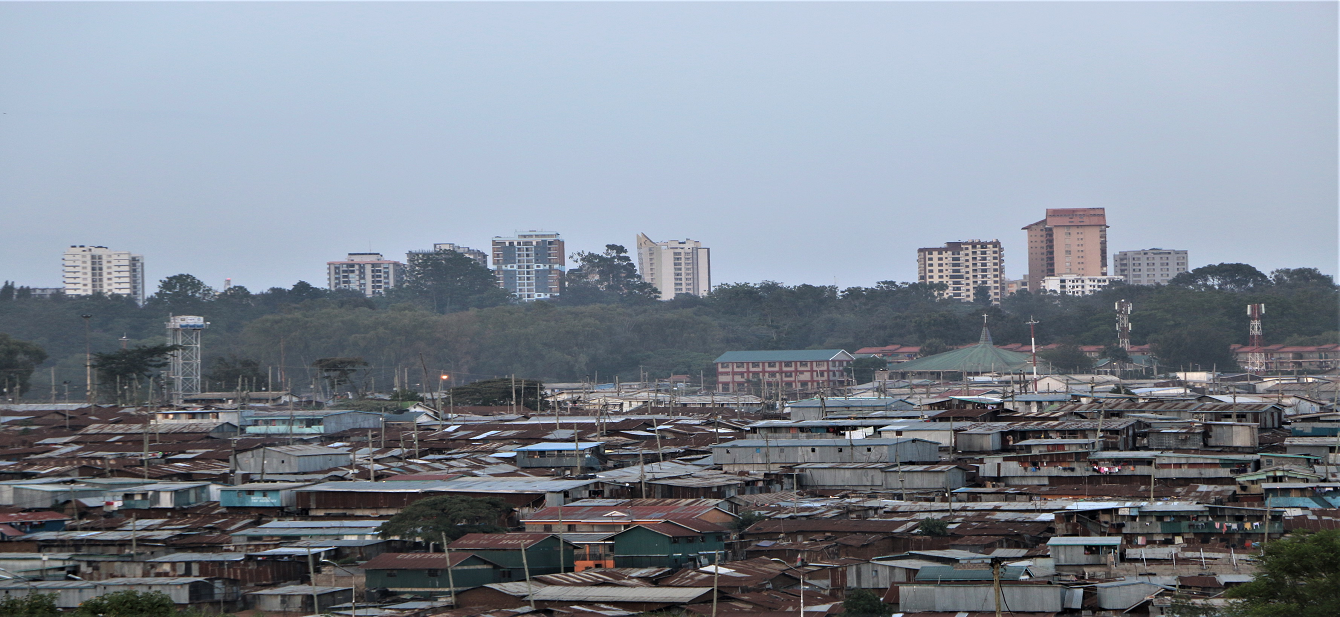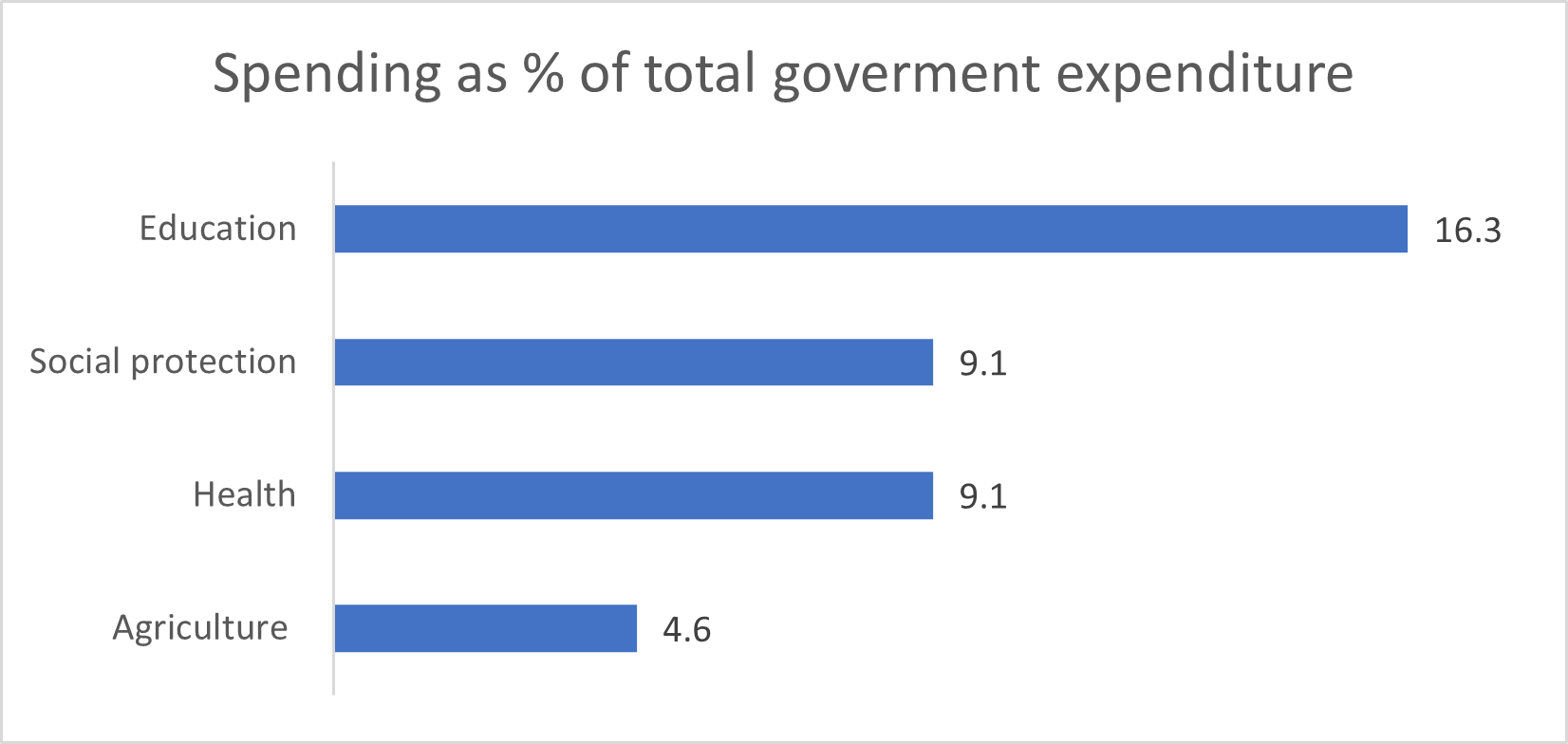Austerity is not the answer to Africa’s colliding challenges

Countries are cutting billions in spending at a time when they should be investing massively in public services and decent jobs.

Credit: Victor Oluoch / OXFAM
In a continent where 1.1 billion people live under $5.50 a day, a slew of connected, damaging events – climate change, ballooning external debt, a sharp spike in food and commodity prices – are making things worse, accelerating inequality and vulnerability. At a time when governments should be tackling this extraordinary combination of crises, a new report launched on 19 April by Oxfam and Development Finance International (DFI) tells a story of inaction. The few governments who are doing a little better at fighting poverty and inequality are still grossly under-performing in comparison with the global top performers.
The new report, Africa’s extreme inequality crisis: building back fairer after COVID-19, is a continental briefing that draws on insights from the Commitment to Reducing Inequality (CRI) Index developed by Oxfam and Development Finance International (DFI). The index scores and ranks 158 global governments on three areas – public services, tax and labour rights – that are pivotal to reducing inequality. It sets out a comprehensive plan for African governments, the African Union and the international community, including the EU, to significantly reduce inequality, eradicate poverty, accelerate growth, and reduce insecurity throughout Africa.
The economic impact of the pandemic
While Africa has largely avoided severe Covid-19 deaths and infections recorded in other parts of the world, it has not avoided economic costs. African governments – like others around the world – found themselves in a tight fiscal spot in responding to the pandemic as revenue dwindled while pandemic related expenditure ballooned.
The pandemic pushed close to 40 million people in Africa into extreme poverty as millions lost jobs and income reduced. Weak social safety nets in most countries worsened the situation. Inequality, which was already at an extreme level pre-pandemic, has increased, too. The richest 1% of the African population now owns 33% of the African wealth, while just six richest African billionaires own more wealth than the bottom 50%, some 650 million people. Gender, racial and spatial inequality persist.
Overall, low-income countries in the continent spent 3.1% of GDP on COVID-19 related fiscal measures while developing countries spent 5.3%, largely on increased health spending and social safety nets. Most of this spending has been clawed back by African countries.
Although the IMF and the World Bank stepped up financial support to the continent, this has been inadequate compared with the magnitude of the pandemic. (The Bank committed $39bn while the Fund has provided close to $38bn through loans, $710 million through debt cancellation and $33bn worth of Special Drawing Rights.)
The pandemic vs. low health care investment
The impact of the pandemic and multiple crises has been made much worse by the fact that most health care systems across the continent are poorly funded. Spending on essential services like health and social protection has historically been dismal (see table below), with less than a half of the population having primary healthcare coverage. Only a third of the elderly people have access to old age pension. Tax collection is wanting, averaging 29% of what could be collected in each country. Before the pandemic, about 67% of workers were in precarious employment, meaning that they were not enjoying the existing labour rights.

Source: Commitment to Reducing Inequality 2020.
The burden of debt and looming austerity
Such inadequate support amid a fiscal squeeze from the pandemic has exacerbated the debt situation in the continent. Spending on essential public services has been hit as governments prioritise debt repayment. Debt servicing for African nations is now an extraordinary six times spending in healthcare, and accounts for 51% of all tax revenue. And as local currencies depreciate against major currencies because of higher inflation rates and hiking of interest rates by central banks in wealthier countries, debt servicing is becoming even costlier.
To reduce the fiscal deficit and address the debt burden, African governments are introducing austerity measures, some with the encouragement of the IMF. Our estimate shows that 43 Africa countries will cut expenditure by $183bn cumulatively for the next five years to 2026. During the first year of the pandemic, the Fund encouraged 33 African countries to pursue austerity policies. We see the impact of austerity in our everyday lives across the continent, for example in Kenya: cooking gas prices have doubled after the IMF agreed on $2.3bn loan in 2021, which has led to taxes on cooking gas.
Food insecurity
Food insecurity is on the rise due to the worst droughts in 40 years triggered by climate change. On top of this, the war inUkraine has disrupted food supply chains and led to a spike in commodity and food prices, worsening the situation. In East and West Africa, 48 million people are experiencing a severe hunger crisis, with 18 million more on the verge of extreme hunger in the next few months. In Kenya, 2.8 million people are facing starvation. Across the world, food prices could also push about 40 million more people into extreme poverty. Most of them can be expected to come from Africa, especially in Sub-Saharan Africa where 40% of income is spent on food.
So what can be done? Start by building resilience and vaccinations
So what can governments and the international community do? Well, an urgent priority must be to build resilience and strong societies that can withstand future shocks. That means overturning the planned austerity investing in quality, affordable and accessible universal health, education, and social protection, and scaling up investment in small-scale agriculture, while raising domestic revenue through progressive taxation.
Another top priority is vaccine inequality. There is an urgent need to fight the pandemic by vaccinating 70% of the region’s population by June 2022. This would prevent another collapse of the economies as a result of lockdowns and reduced mobility and crumbling of the healthcare system if a more virulent virus like omicron were to emerge.
To enhance comprehensive continental effort to fight inequality, the African Union should develop a joint continental action plan to set clear targets and accelerate measures to reduce inequality and poverty. The recent AU protocol to the African Charter on Human and People’s Rights on the Rights of Citizens to Social Protection and Social Security agreed to at the last AU summit is a good starting point and will require member states ratifying and implementing it at national level.
The international community also has a crucial role. First, they should help address the debt crisis in the region, including through debt cancellation and restructuring and increased aid to the continent to build back better. Second, they should mandate the IMF and World Bank to ensure that all AU country strategies, programmes and policy advice focus on reducing inequality, and contain specific measures to achieve this.
Such debt cancellation can help African nations reject the policies of austerity that can only increase the misery, poverty and hunger of millions. It’s time to reverse course and instead invest massively for an inclusive recovery and a fairer future for people across the continent.







Nowhere in the article have you addressed overpopulation and/or population growth. Zambia’s population grows by close to 3%pa – around 480,000. Over 50% of the population is under 18. there are less than 700,000 salaried/waged jobs in the country. 40% of the population lives in towns. Food can be grown (not if you are in a town) , bought (not if you don’t have an income), stolen (or bought with the proceeds of crime) or given. If given, by whom, as it has to be paid for.
I dispute the statistic about pensions for older people. In Zambia I would estimate this at close to 0. In terms of taxes, the demand for services eg healthcare, social welfare, education etc has to be funded from the same taxpayers as hitherto. there is scope to tax mines more, but there is a limit to that. Overpopulation is a pan-African problem, and we know that disgruntled unemployed youth will mobilise, or will be mobilised by radicals. It’s a time bomb